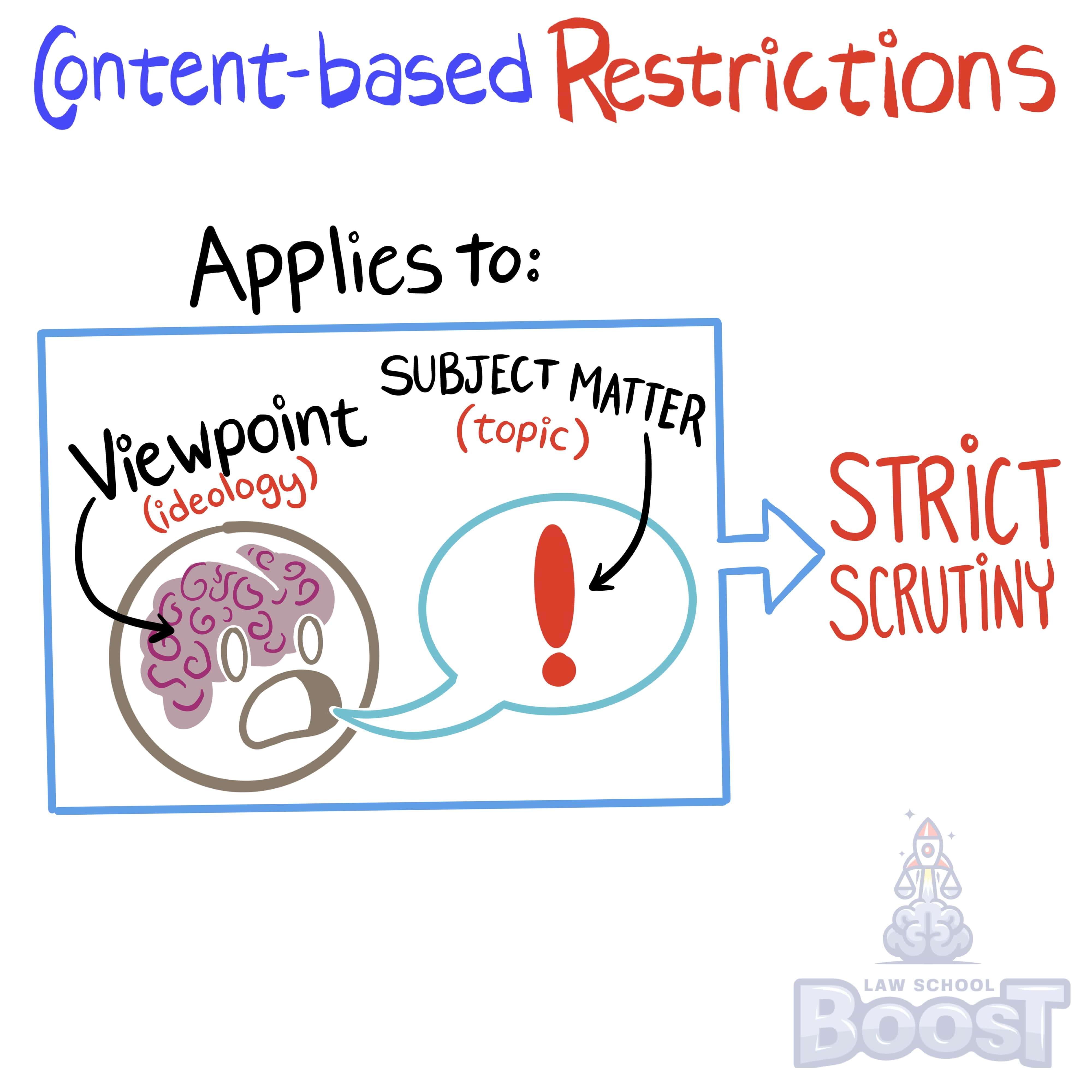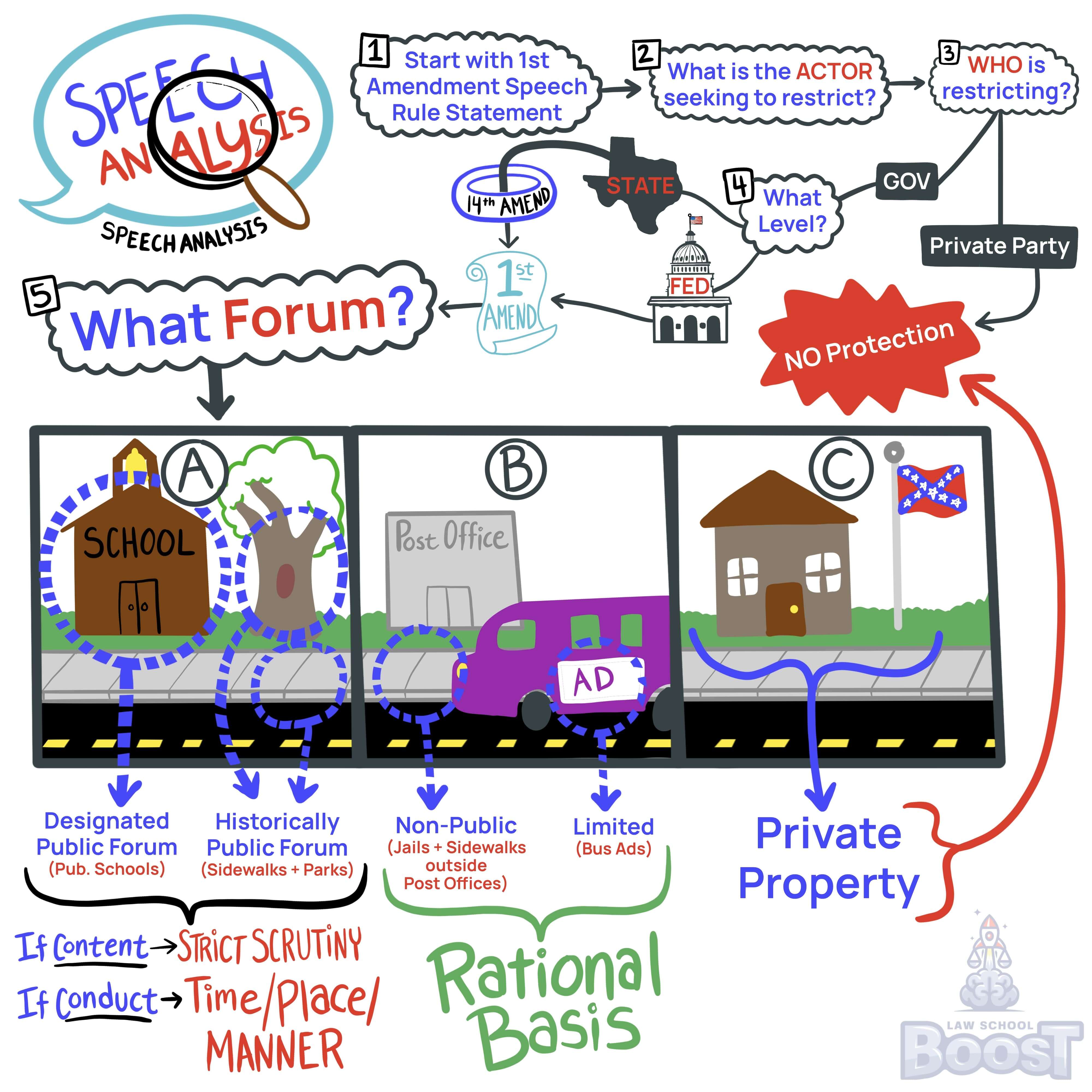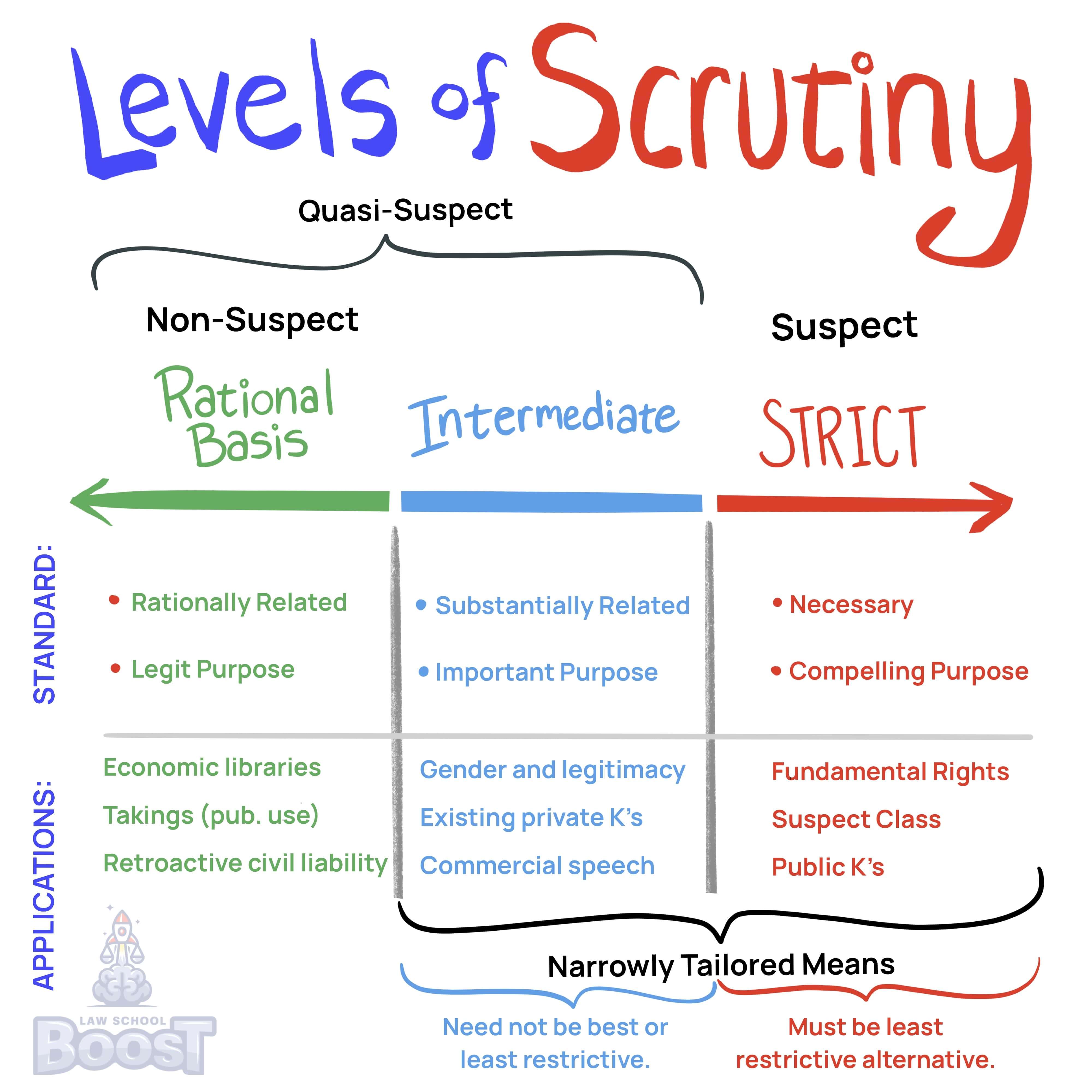🇺🇸
Constitutional Law • First Amendment - Free Speech
CONLAW#118
Legal Definition
Content-neutral restrictions that burden speech are subject to intermediate scrutiny, and must advance important interests unrelated to the suppression of speech and must not burden substantially more speech than necessary to further those interests.
Plain English Explanation
When the government makes laws that affect our ability to speak freely but don’t target what we’re actually saying, these laws have to be carefully checked to make sure they're fair. Essentially, these rules can't just be about shutting people up. The government needs to show that these rules are really about achieving something important that has nothing to do with limiting what we can say. For example, think about noise laws that keep neighborhoods quiet at night. These laws aren't about stopping people from speaking their minds, but about keeping the peace so everyone can sleep. Also, these laws must be just right—they shouldn't stop more speech than what is absolutely necessary to meet their goals. It’s like using a scalpel instead of a sledgehammer; the approach needs to be precise and not overdone.
Hypothetical
Hypo 1: The city of Hypovale bans all signs and posters on public property in order to keep things looking neat and tidy. Sam wants to put up flyers protesting the mayor's policies, but the city tears them down, citing the signage ban. Result: The city's rule against signs is content-neutral, since it applies to all signs regardless of what they say. As long as Hypovale can show that it has an important interest in avoiding visual clutter, and that banning signs altogether is a reasonably targeted way to achieve that goal, the restriction would likely survive intermediate scrutiny. Sam's political speech doesn't get special protection here. The First Amendment doesn't guarantee him the right to post his message anywhere he wants.
Hypo 2: New Hypoland enacts a law requiring a permit for any gathering of more than 25 people in a public park. The application process takes 30 days and costs $100. Bob wants to hold a rally next week to protest police brutality, but he can't get a permit in time or afford the fee. Result: The permit requirement doesn't seem to be motivated by the content of anyone's speech. But it seriously burdens political demonstrations and other expressive gatherings by making them harder to organize, especially on short notice. A court would likely find that it restricts substantially more speech than necessary and fails intermediate scrutiny. The government's interest in regulating large crowds could be served by a less complex permit process.
Hypo 3: Hypofornia bans targeted picketing within 500 feet of any residence. Bob wants to lead a protest march through a neighborhood where a politician he opposes lives. The police order him to stay 500 feet away from the politician's house. Result: The law is content-neutral because it doesn't target any particular message or point of view. Its purpose is to protect the privacy and tranquility of people's homes. A court would probably decide that this is a significant government interest, and that a 500-foot buffer zone doesn't burden more speech than needed to serve that interest. Bob is free to picket elsewhere, just not right in front of someone's private residence.
Hypo 4: At the Hypofornia State Fair, there's a rule that says demonstrators can only gather in a certain designated area and can't approach people to hand them leaflets or petitions. Bob tries to collect signatures for his petition protesting animal cruelty, but he's told to stop talking to people and go to the "free speech zone." Result: The restriction on petitioning at the fair is content-neutral, but it might not pass intermediate scrutiny. The fair probably has a legitimate interest in maintaining the orderly flow of foot traffic. However, a court could find that relegating all demonstrators to a limited area unreasonably confines speech to an out-of-the-way "ghetto," rather than narrowly serving the state's crowd control needs. Letting people share their views more widely while leaving room for others to pass by might be a better balance.
Hypo 2: New Hypoland enacts a law requiring a permit for any gathering of more than 25 people in a public park. The application process takes 30 days and costs $100. Bob wants to hold a rally next week to protest police brutality, but he can't get a permit in time or afford the fee. Result: The permit requirement doesn't seem to be motivated by the content of anyone's speech. But it seriously burdens political demonstrations and other expressive gatherings by making them harder to organize, especially on short notice. A court would likely find that it restricts substantially more speech than necessary and fails intermediate scrutiny. The government's interest in regulating large crowds could be served by a less complex permit process.
Hypo 3: Hypofornia bans targeted picketing within 500 feet of any residence. Bob wants to lead a protest march through a neighborhood where a politician he opposes lives. The police order him to stay 500 feet away from the politician's house. Result: The law is content-neutral because it doesn't target any particular message or point of view. Its purpose is to protect the privacy and tranquility of people's homes. A court would probably decide that this is a significant government interest, and that a 500-foot buffer zone doesn't burden more speech than needed to serve that interest. Bob is free to picket elsewhere, just not right in front of someone's private residence.
Hypo 4: At the Hypofornia State Fair, there's a rule that says demonstrators can only gather in a certain designated area and can't approach people to hand them leaflets or petitions. Bob tries to collect signatures for his petition protesting animal cruelty, but he's told to stop talking to people and go to the "free speech zone." Result: The restriction on petitioning at the fair is content-neutral, but it might not pass intermediate scrutiny. The fair probably has a legitimate interest in maintaining the orderly flow of foot traffic. However, a court could find that relegating all demonstrators to a limited area unreasonably confines speech to an out-of-the-way "ghetto," rather than narrowly serving the state's crowd control needs. Letting people share their views more widely while leaving room for others to pass by might be a better balance.
Visual Aids



Related Concepts
Are fighting words protected speech?
Are profane and indecent speech protected?
Can government speech be challenged?
How do you analyze a free speech issue?
Is anonymous speech protected?
Is discretion allowed in determining fees for public demonstrations?
Is speech protected when it incites illegal activity?
May the government seize assets of businesses that violate obscenity laws?
What are content-based restrictions, and which level of scrutiny is applied?
What are designated public forums?
What are limited public forums?
What are non-public forums?
What are prior restraints and when are they valid?
What are public forums?
What are the limits of free speech during a broadcast?
What does the 1st Amendment prohibit, and how is it applied?
What is the 1st Amendment right to access private property for speech?
What is the constitutionality of laws prohibiting group discrimination?
What level of scrutiny is applied to content-based restrictions on public forums?
What level of scrutiny is applied to court orders suppressing speech?
What level of scrutiny is applied to laws impacting freedom of association?
What level of scrutiny is applied to laws that require disclosure of group membership?
What rights do the press have in addition to those granted to private citizens?
When are obscenities and sexually oriented speech considered obscene?
When are time, place, and manner restrictions on speech valid?
When is a law unconstitutionally overbroad?
When is a law unconstitutionally vague?
When is commercial speech protected, and when is it not?
When is speech by government employees not protected?
When may a private figure recover for defamation if there is no matter of public concern?
When may a private figure recover for defamation regarding a matter of public concern?
When may a public official or figure recover for defamation?
When may the government ban child pornography?
When may the government burden lawful, non-misleading, non-fraudulent commercial speech?
When may the government punish or limit news reporting?
When may the government punish private possession of obscene materials?
When may the government regulate symbolic speech?
When may the government require a license for speech?
When may the government use zoning ordinances to regulate adult businesses?


